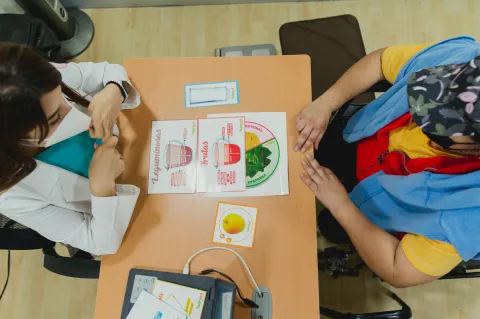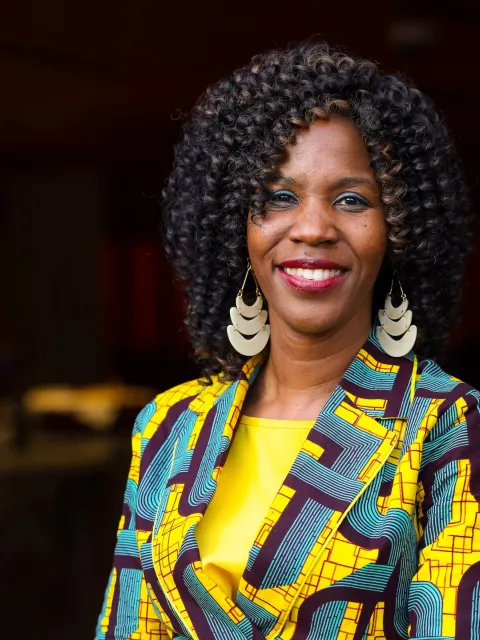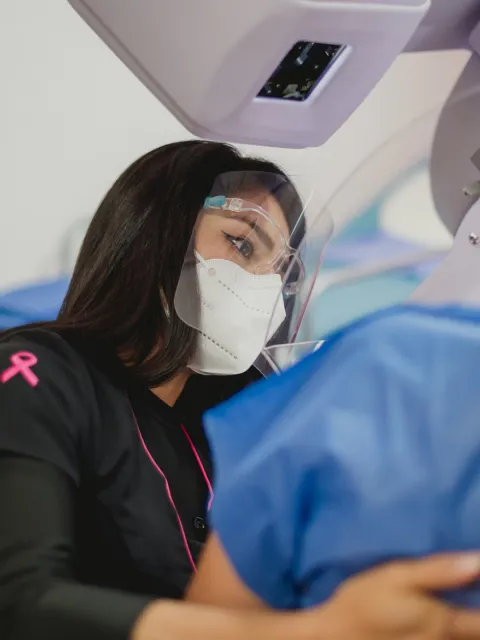National action to improve the early detection of breast cancer
The early detection of breast cancer can be improved through cost-efficient screening methods, training of health workers, raising public awareness and improved patient navigation.

Solutions exist to detect breast cancer early in limited resource settings, despite significant challenges due to a lack of infrastructure, funding and trained healthcare professionals
HIGHLIGHTS
- Countries with limited resources face challenges in effectively detecting and treating breast cancer early, resulting in disparities in health outcomes between high- and low-income countries.
- Mammography is not the only screening option. In certain circumstances, Clinical Breast Examination (CBE) has been shown to lead to an earlier diagnosis and a 30% reduction in breast cancer-related mortality.
- Reducing stigma, improving public education and awareness of breast health, coordinated efforts of healthcare professionals and rapid referral to treatment, are also essential for improving survival rates.
- UICC has supported 19 projects by member organisations to improve the early detection and timely diagnosis of breast cancer in LMICs through advocacy, the education of health care workers and patient navigation.
Countries with limited resources face significant challenges in effectively detecting and treating breast cancer early due to a lack of infrastructure, funding and trained healthcare professionals.
This has led to significant disparities in health outcomes between high- and lower-income countries. In high-income countries, where routine screening and high-performing mammography facilities and treatment services exist, survival rates at five years are over 90%; in South Africa, they are as low as 40%. And while breast cancer is the leading cause of cancer deaths for women worldwide, low- and middle-income countries (LMICs) will account for 70% of the estimated one million new deaths annually by 2040 at current trends.
Furthermore, persistent misconceptions exist concerning effective strategies for early detection – notably the notion that mammography constitutes the only viable screening option. There are, however, solutions to improve the early detection of breast cancer in limited resource settings.
On 4 February 2023, World Cancer Day, WHO launched its Global Breast Cancer Initiative Framework, providing a roadmap for the implementation of the strategy outlined by WHO in its Global Breast Cancer Initiative (GBCI), which aims to reduce the number of lives lost to breast cancer by 2.5 million by 2040.
The Framework focuses notably on “assessing, strengthening and scaling up of services for the early detection and management of breast cancer,” and is based on a three-pillar strategy.
- Health promotion for early detection: Achieve the diagnosis of at least 60% of invasive breast cancers at stage I or II.
- Timely diagnosis: Complete evaluation, imaging, tissue sampling and pathology of the disease within 60 days.
- Comprehensive breast cancer management: Ensure that 80% of patients undergo a full course of multimodality treatment and successfully return home.
The International Agency for Research on Cancer recently launched an Atlas of breast cancer early detection, which provides more detail on the targets and the three pillars of the GBCI.
“We have the tools and the know-how to prevent breast cancer and save lives. WHO is supporting more than 70 countries, particularly low- and middle-income countries, to detect breast cancer earlier, diagnose it faster, treat it better and give everyone with breast cancer the hope of a cancer-free future.”
– Dr Tedros Adhanom Ghebreyesus, Director General of the World Health Organization, at the launch of the GBCI Framework.
On the occasion of the World Cancer Congress in Geneva, UICC organised a workshop in collaboration with the WHO GBCI to address the challenges and outline cost-effective solutions related to the early detection of breast cancer.
At the workshop, Dr Ben Anderson, Medical Officer leading the GBCI at WHO, emphasised that training doctors and nurses in clinical breast examination (CBE), for the ‘opportunistic’ screening of women who present with symptoms, has proven to be an efficient strategy to diagnose breast cancer in limited settings.
Dr Partha Basu, Head of the Early Detection, Prevention and Infections at the International Agency for Research on Cancer (IARC), presented a study on the efficiency of CBE carried out over a period of 20 years in Mumbai, India.
The results showed that CBE conducted every two years by primary health workers led to a significantly higher number of breast cancer cases being diagnosed earlier and a 30% reduction in breast cancer-related mortality among women aged 50 and older. This long-term study confirms that CBE should not be disregarded by health systems, particularly when compared to situations where there is otherwise no screening and in LMICs without resources to implement a screening programme based on mammography.
While it is true that organised mammographic screening reduces the proportion of late-stage disease, a study published in the New England Journal of Medicine shows that similar results can be achieved in the absence of population-wide mammographic screening through multiple coordinated interventions, including reducing stigma and improving public education and the awareness of breast health.
A timely diagnosis, including coordinated efforts of radiologists, pathologists and surgeons with an organised patient navigation system, as well as rapid referral to treatment are also essential to improving survival rates. In this area, Dr Maira Caleffi, UICC Board Member and Volunteer President of FEMAMA in Brazil, explained at the workshop how the organisation successfully advocated in 2019 for a law mandating that any cancer diagnosis must be reported within 30 days of the patient first interacting with the health system.
"Attending the WCC Breast Cancer Workshop was a truly beneficial experience. What I found most valuable was learning about the evidence for the use of clinical breast examination (CBE) as a screening method, and knowing that there is real value in developing and sustaining its use in our resource-limited settings. In addition to sharing this knowledge with clinicians, we are planning to have training sessions with doctors and nurses on performing CBE to ensure the correct technique is used consistently, and women with suspicious findings are referred for further investigations without delay."
– Dr Nazima Dharsee, Head of the Academic and Research Department, Ocean Road Cancer Institute, Tanzania
National examples on civil society advancing early detection of breast cancer in LMICs
Just over a year ago, UICC supported four projects to improve the early detection and timely diagnosis of breast cancer in LMICs through advocacy, the education of health care workers and patient navigation, with grants of USD 20,000 each. These projects were carried out by UICC member organisations in Brazil, Jordan, Botswana and Kenya, and completed in October 2022.
- FEMAMA in Brazil drafted and advocated for a law that ensures that patients at risk for breast cancer genetic mutations perform diagnostic tests under the Unified Health System. The law will be voted on in March this year.
- The King Hussein Cancer Foundation in Jordan engaged key policymakers on ‘how to conduct mass campaigns’, ‘advocacy for equitable early detection services’, ‘working with the media’ and ‘women’s willingness to pay for breast cancer screening’.
- The Botswana Rutgers Partnership for Health conducted a training course on patient navigation and breast cancer guidelines to improve the diagnostic interval and timely access to treatment.
- The International Cancer Institute in Kenya trained 120 community health volunteers on screening for breast (and cervical) cancer in Kisumu County. The Institute aims in future to introduce a digital platform for real-time data collection.
The four projects collectively supported 264 patients, reached over a half a million people with awareness campaigns, trained nearly 300 professionals and engaged some 1,500 policymakers.
As part of its Breast Cancer programme, in 2022, UICC awarded a further 15 additional grants to projects offering an evidence-based approach to improving early detection. Projects started in October 2022 and will be implemented for a maximum duration of one year.
Last update
Wednesday 01 March 2023
